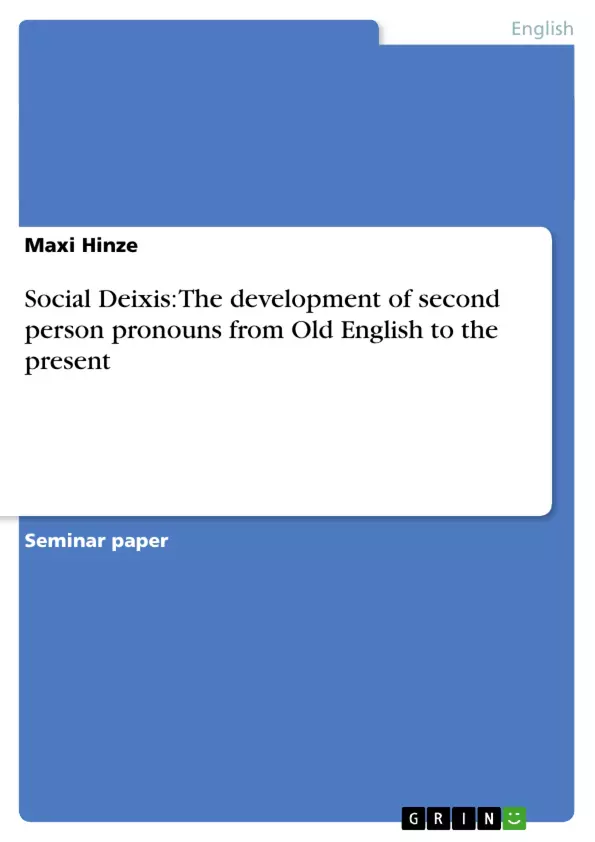The word "deixis" is of Greek origin and means "pointing" or "indicating". In linguistics this term denotes a word or phrase that directly and categorically refers to temporal, locational, or personal characteristics of a communicative event and its participants.
Deixis lies in between the fields of semantics and pragmatics. Linguists differentiate 5 categories of deixis: person, place, time, discourse and social deixis.
This paper will be concerned with the category of social deixis which encodes the features of the communicative event which mark the social identity of the speaker or addressee, and the social relationship that holds between them.
In particular, the study of pronouns has a high degree of relevance in our everyday lives, as their appropriate use has ever been the concern of (socio-)linguists and average users alike.
In this paper I will explain the dimensions of power and solidarity and analyse the development that 2nd person pronouns have undergone from Old English until today. Furthermore, my paper is concerned with non- verbal communication and cultural differences and it includes a discussion on the question "When is it likely that there is a change of address and who has the right to propose a change?".
Inhaltsverzeichnis (Table of Contents)
- Introduction
- The Pronouns of Power and Solidarity in earlier stages of English
- The dimensions of power and solidarity
- 2nd person pronouns in Old English
- Forms of address in Middle English
- Forms of address in Modern English
- Non-Verbal communication and cultural differences
- Discussion
- Summary
- References
Zielsetzung und Themenschwerpunkte (Objectives and Key Themes)
This paper examines the development of 2nd person pronouns in the English language from Old English to the present, focusing on the relationship between pronoun choice and social dynamics, particularly power and solidarity.
- The evolution of 2nd person pronouns in English, highlighting the shift from distinct forms for singular and plural to a single form in Modern English.
- The role of power and solidarity in determining pronoun usage, examining the T/V distinction and its application in various historical periods.
- The influence of cultural differences on forms of address, exploring how non-verbal communication and social norms impact pronoun choice.
- The sociolinguistic implications of pronoun usage, considering how appropriate pronoun choice can impact communication and social relationships.
Zusammenfassung der Kapitel (Chapter Summaries)
The introduction defines "deixis" and introduces the concept of social deixis, focusing on its relevance in everyday life. The paper then delves into the pronouns of power and solidarity in earlier stages of English, examining the dimensions of power and solidarity and their impact on pronoun choice in Old and Middle English.
Further chapters explore the forms of address in Modern English, highlighting the impact of non-verbal communication and cultural differences on pronoun usage. The paper also discusses the sociolinguistic implications of pronoun choice and the factors that influence changes in forms of address.
Schlüsselwörter (Keywords)
This paper explores key themes of social deixis, power and solidarity, pronominal address, T/V distinction, language usage, cultural differences, sociolinguistics, and the history of the English language.
- Quote paper
- Maxi Hinze (Author), 2006, Social Deixis: The development of second person pronouns from Old English to the present, Munich, GRIN Verlag, https://www.grin.com/document/69060




